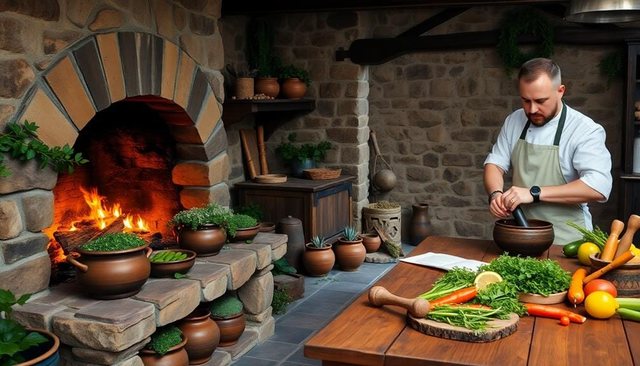
In an era where culinary innovation often means advanced techniques and unusual flavor combinations, a new movement is gaining momentum around the world: a return to traditional cooking. Amid globalization, the fast pace of life, and the spread of fast food, people are seeking more authenticity, warmth, and a connection to their cultural roots through food.
This phenomenon is not simply a nostalgia for the past, but a deep need for identity, meaning, and authentic experience.
1. A new wave of interest in old recipes and techniques
Today, more and more professional and amateur chefs are turning to:
- Grandmothers' recipes, those that have been passed down from generation to generation, filled with history and tradition.
- Ancient techniques of fermentation, wood-fired oven baking, natural drying, and chemical-free food preservation.
- Local and seasonal products, reviving forgotten varieties and natural ways of cultivation and preparation.
From homemade yogurt in Albania to kimchi in Korea, from artisanal pasta in Italy to tamales in Latin America, the world is once again embracing the gastronomic treasures of the past.
2. Why do people seek authenticity through food?
There are several strong reasons behind this global trend:
The need for emotional connection
Traditional food evokes family memories, cultural roots, and a sense of belonging that modern technology often loses.
The search for health and naturalness
Fresh produce, old-fashioned processing methods, and the lack of artificial ingredients make traditional food a healthier choice.
Rebellion against food industrialization
In a world dominated by packaged and uniform products, traditional cooking offers authentic, unique flavors linked to a specific place and culture.
Increasing cultural awareness
Younger generations want to preserve cultural heritage through food, seeing it as a form of identity and resistance.
3. Traditional gastronomy on the global stage
The trend of returning to tradition is not limited to local communities; it is becoming a global phenomenon:
Specialty restaurants that recreate authentic recipes with a commitment to original preparation methods are on the rise around the world.
Renowned chefs such as Massimo Bottura, Alice Waters or José Andrés have promoted the importance of tradition, local produce and respect for nature in their culinary creations.
Media and social platforms have helped revive old recipes, bringing lost stories and authentic flavors from different corners of the world to the public's attention.
International food festivals, as well as cookbooks dedicated to traditional cuisine, are also playing a key role in preserving and promoting these treasures.
4. Tradition as a source of new innovation
Interestingly, tradition is not being seen as a limitation, but as a source of inspiration:
Young chefs combine traditional techniques with modern innovation, creating dishes that honor roots but speak a contemporary language.
Artisanal producers develop new ways to adapt ancient techniques to the modern market, such as naturally fermented cheeses, naturally leavened breads, or natural, sulfite-free wines.
Gastronomic education is increasingly including culinary history courses and traditional techniques as part of the training of young chefs.
In this way, gastronomic culture evolves without losing its essence and spirit.
Returning to tradition in cooking is not a step back, but a conscious return to the flavors, values, and roots that connect us as humans.
In a world where everything changes at breakneck speed, a dish prepared with love according to an old recipe can become a form of resistance, an act of remembrance, and a bridge between the past and the future. Ultimately, the best food is the one that roots us in history, culture, and memories.





